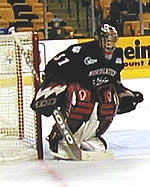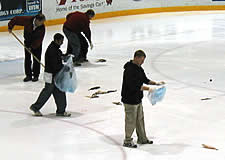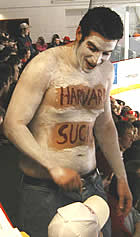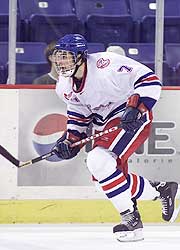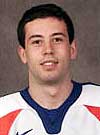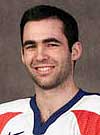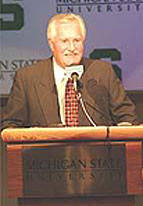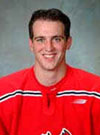How ‘Bout Them Rams?
With this column’s jinx having now extended Boston College’s losing streak to six games and UMass-Lowell’s to five, it’s time to talk some football.
Specifically, let’s talk about the unbeatable St. Louis Rams.
Great team speed yada yada yada.
Marshall Faulk yada yada yada.
Kurt Warner yada yada yada.
Isaac Bruce yada yada yada.
Tory Holt yada yada yada.
Aeneas Williams yada yada yada.
Mike Martz yada yada yada.
The Rams are clearly the best team in football. Positively unbeatable.
Black Bears Bouncing Back
Their fortunes took a detour a couple weeks ago when Northeastern took three of four points from Maine, but back-to-back sweeps over Merrimack and UMass-Lowell have vaulted the Black Bears to second place in Hockey East and sixth nationally.
“The University of Maine has a team that has the potential to win a national championship,” says UMass-Lowell coach Blaise MacDonald. “They have all the ingredients it takes: great goaltending, special teams and highly, highly skilled forwards that have great puck sense and awareness. I would be shocked if they are not playing on the last day of the season.”
The Black Bears’ 4-1 win over Lowell on Saturday acted as the season in a microcosm. They got off to a slow start, allowing 16 shots on goaltender Mike Morrison. The senior, who has emerged from a backup role in past years to post a 1.95 GAA and .934 save percentage, stopped all 16 shots to keep Maine in the game until it could upgrade its play in both ends during the second and third periods.
The improvement since the start of the season has been most notable in the defensive end, where the team’s inexperience and lack of depth had rendered it suspect. The Black Bears offense may be second only to New Hampshire’s, but its defense had to rely on Morrison to bail them out during much of the first semester.
“It’s definitely been a learning experience for those guys, especially with the adversity we’ve faced,” says Morrison. “They’ve had a full load and really handled it well.
“That’s something we talked about going into [the Lowell] series. We had 12 Hockey East games by us. We were right at the midpoint of Hockey East. We told them, ‘There are no more freshmen on this team.’
“That’s the great thing about this league. Halfway through [your freshman] season, you’re ready to play.
“They just keep getting better and better. With that, their confidence is growing. From my standpoint, it’s great to see.”
"I don’t think I’ve ever been involved in a tournament where I could truly say that any one of the teams could easily win the tournament. This is as well balanced of a field as we’ve had. [They are] all talented teams."
— BU coach Jack Parker on this week’s Beanpot
Combined with Morrison’s excellent goaltending, a deep offense and strong special teams, the emerging defense could be the final piece to the puzzle.
Arguably, the last major question — Maine’s ability to win on the road — was answered with an exclamation point last weekend with the sweep at Lowell. Going into the series, the Black Bears had posted a 10-1-2 record at Alfond but only a 2-4-2 mark on the road.
“We’ve gotten stronger as the year has gone on,” says Maine interim head coach Tim Whitehead. “We had quite a few road games early.
“More than anything, we’ve tried to play more consistently whether we’re at home or away and play better defensively. That’s helping us on the road.”
Which brings us to Maine’s foe at Alfond Arena this weekend, second-ranked New Hampshire.
Wildcats Showing Their Claws
Boston University coach Jack Parker has no mixed feelings about who the best team in the league is after UNH swept his Terriers. The Wildcats embarrassed BU at the Whittemore Center, 6-1, and came from behind to win on the road, 5-3.
“They took five out of a possible six points against us this year,” says Parker. “There’s no question who the best team in the league is as far as we’re concerned. They looked pretty sharp to me.
“That’s the best UNH team against BU that I’ve ever seen simply because they’ve never done that to us. If somebody is going to get five-out-of-six points, it’s usually going to be BU getting it against UNH, not the other way around.
“I’m real impressed with them. I’m real impressed with an unheralded defense. They play hard and they play well together.
“Stopping [Darren] Haydar doesn’t do much because they’ve got a lot of other things going for them. We did a real good job of making sure he didn’t beat us. He didn’t, [but others did].”
One of those “others” is Josh Prudden, whose two goals on Sunday included a game-winning breakaway. Prudden typically centers Colin Hemingway and Lanny Gare on UNH’s second line, an effective unit that helps keep the heat off the Haydar trio.
“Colin and Lanny are the snipers on the line,” says Prudden. “I see myself as trying to set them up more than anything else and doing the dirty work down in the corners in our own end.
“It does help to have a second line that can score like our line. It takes a lot of pressure off Darren. Playing with Colin and Lanny makes it a lot easier.”
UNH coach Dick Umile recognizes Prudden’s worth even though the junior typically gets overshadowed by Haydar, the Hobey candidate, and Hemingway, the All-America hopeful.
“Josh doesn’t give himself a lot of credit,” says Umile. “Right now, he is playing as well as anybody for us. He’s real strong on the puck and he made a great move fighting off the backchecker [on the game-winning breakaway] to make the move to put it in the net. He’s playing tremendous.”
Another undersung contributor this past weekend was Ed Caron. On Sunday, he showed the full range of his talents, scoring a finesse goal early, deking BU goaltender Sean Fields on a breakaway, before adding a classic power-forward tally in which the 6-3, 220-pounder knocked a BU defender off the puck and then scored on a wraparound. Not to mention some jaw-rattling checks.
“That’s what he is: a big power forward, a young kid that can score goals,” says Umile. “It was a great effort on his part. He’s a great kid. He makes a lot of stuff happen. He’s got a lot of game. He’s a big, strong kid that can play hockey.”
Despite UNH’s success — 10-1 in its last 11 games and 15-2 in its last 17 — Umile isn’t paying attention to his team’s flirtation with the number one position in the national rankings.
“We’re just worried about Hockey East right now, to be honest,” he says. “We want to stay in first place in Hockey East and we’ll be happy with that. You start paying attention to [polls] and you’ll be on the bottom real fast.”
Beanpot
In past years, Boston College has flaunted some dominating talent going into the Beanpot while Boston University has claimed the tournament to be its own private domain, winning six straight from 1995-2000. This year, however, there may be no clear favorite and no clear underdog. All four have spent time in the national rankings.
“I don’t think I’ve ever been involved in a tournament where I could truly say that any one of the teams could easily win the tournament,” says BU coach Jack Parker. “This is as well balanced of a field as we’ve had. [They are] all talented teams.”
BU has admittedly lost two straight, but those were to second-ranked New Hampshire, a team that has put a hurtin’ on plenty squads. BC has lost six straight while playing with a short roster, but bodies should start to return soon. Northeastern lost on Saturday to UMass-Amherst, but prior to that had posted a 5-0-1 streak, with five of those six games against nationally ranked teams. And Harvard has won four of its last five, moving up to second place in the ECAC.
“It’s the Beanpot and anything can happen,” says coach Bruce Crowder, whose Huskies take on Harvard in the early game. “The thing that we’re excited about is that we’re probably playing the best hockey of the year right now. We’re coming off some pretty good wins.
“Our thing, as coaches, is we just want to make sure that — whether it’s the goalie, the defensemen or the forwards — they bring their ‘A’ game. We can’t ask for any more than that. If they do that, I like our chances.”
Even so, Crowder is wary of the Crimson.
“Harvard is an excellent team,” he says. “I really respect their forwards, probably as much as I do any in the country. That’s going to be a heckuva challenge for us, especially playing four freshmen defensemen and a freshman goalie. How we handle their forwards is going to be a big key for us. If we do a good job, that’s going to put us in a pretty good position to win the hockey game.”
In the nightcap, it’s a rematch of last year’s championship game, Boston College vs. Boston University. In that contest, the Eagles finally wrestled away the Beanpot crown that BU had worn for six straight years.
“Our club has been progressing during the course of the year,” says BC coach Jerry York. “We’ve lost some games recently, but hats off to [Lowell, BU and Providence], certainly among the nation’s top teams. We are getting better and we’re looking forward to a terrific tournament on Monday.”
Adds senior captain Jeff Giuliano, “This year has had a lot of ups and downs. We’ve had some injuries and over the last six games we’ve lost six games in a row, but we’ve pulled the goalie in every game. So we feel that if we keep working hard, we feel we’ll start getting some bounces.”
Late update: Contrary to initial expectations, Ben Eaves will remain sidelined for the first round with a rib injury.
BU and BC have already played their three Hockey East games, with mixed results.
“We’ve had success against a partial Boston College team this year,” says Parker. “The game we lost, Eaves played and they had a full lineup. The other two games that we [won], Ben Eaves did not play either game and they kept losing players in the course of the game.
“We’re not sure which Boston College team is going to show up. I know that we’re going to prepare for the best Boston College team and when they have everybody, they have quite a lineup.
“They have the best power play we’ve seen in the league. We’re going to have to be real disciplined and stay out of the box and make sure that we do a good job penalty killing when we do get penalties.
“They can come at you forechecking as well as any team in our league and they really do a great job of initial rushes coming through center ice. So they present a lot of problems.
“We just came off a weekend where we played, I think, the best team in our league, UNH. They are a very similar team as far as up front speed and the ability to create plays through center ice and a great power play. It wasn’t the outcome we would have liked this past weekend, but it certainly was great practice getting ready for Boston College.
“Our team has had an up-and-down season, [but] we are pleased with our record thus far and we’re pleased with our progress thus far. The main contributor to our success thus far has been team defense. We’ve gotten great goaltending from Sean Fields for most of the year. He’s given us real solid goaltending and has given us a lot of confidence in that position.
“Our defensive corps is as good as anybody’s in the league when we’re playing up to our capabilities. We’ve got a nice mix of upperclassmen and freshmen playing there and doing a good job for us led by our co-captain Chris Dyment. He’s done a terrific job on defense for us for his four years and he’s having a great senior year.
“Up front, with the exception of our other co-captain Mike Pandolfo, our goal scoring has been pretty spread out. Mike is far and away our best goal scorer right now. Everybody else has chipped in. We don’t have the big first line that everybody worries about stopping, but we do have a pretty good balanced attack when we’re moving the puck and moving our feet. We can put pressure on people and we can play pretty solid defense on all four lines.
“The biggest difference between the three clubs and ourselves is that all of us have done a pretty good job of killing penalties for most of the year and that’s been our biggest asset on special teams. But we’ve really struggled on the power play. We’ve got the worst record in a long time at Boston University. We know that we’ve got enough talented players, but we seem to be jumpy on the power play and that’s really hurt us.”
Emerging From The Shadows
Senior Leon Hayward and sophomores Brian Tudrick and Trevor Reschny have been important contributors of late to Northeastern’s attack. They frequently match up with the opponent’s top line and have at the same time provided a scoring punch. Reschny got the game-winner against UMass-Amherst last Friday. A week before that, Hayward scored two goals, including a game-winner, and Tudrick another in a sweep of UMass-Lowell.
“It’s always nice to get recognized,” says Hayward. “Trevor was a really good player coming in and Brian Tudrick has improved a ton. They both redshirted so they had that time to sit and wait. I was always one of those guys who was a role player, not necessarily sitting and waiting, but just waiting to get an opportunity to play regularly. It’s been a great experience for us.
“I think we’ve played together the last 15 or 16 games. We’re real comfortable with each other on and off the ice. We spend a lot of time [together] and have a really good rapport. I think that really adds to our success on the ice.”
A Heckuva Start
UMass-Amherst forward Josh Hanson got out of blocks amazingly fast last weekend. Playing the first games of his collegiate career after just joining the roster-depleted Minutemen, Hanson scored a goal on Friday night and then on Saturday assisted on both the game-tying and game-winning goals in a comeback win over Northeastern. As a result, he was named Hockey East’s Rookie of the Week.
Not a bad debut.
Hanson, 5-10 and 185 pounds, had been playing for the Texas Tornado in the North American Hockey League. In 31 games, he’d scored 16 goals with 22 assists for 38 points, totals that placed him ninth in NAHL scoring.
“It’s interesting how this unfolded,” says UMass coach Don “Toot” Cahoon. “He was playing in Texas as a 20-year-old from Medford, [Mass.], and he was close to turning 21. He knew that if he was still playing there [when he turned 21], he’d lose a year of eligibility. So on his own, he set out to find a program that was a good fit.
“He saw that Scott Horvath had left the team and that Brad Nizwantowski’s situation had left us shorthanded up front so he contacted us via email.
“He said, ‘I thought I’d be a good fit for your team. I was a pretty good student in high school, but still opted to play juniors. I’ve taken courses at a community college to stay active academically. Would you consider giving me a shot?’
“So we made a few phone calls. We weren’t going to have to go to great lengths to get him admitted. He was an in-state kid and he’d already been through the NCAA Clearinghouse. He had community college credits and [very strong] SATs.
“Once we got him admitted, we got him involved. We were down [in numbers] with injuries and [other attrition], so we threw him in.
“He’s not explosive. He’s not a Darren Haydar or Ben Eaves. He’s not a Peter Fregoe or Devin Rask. But he’s patient with the puck. He’s game savvy. He makes good decisions. He can be a contributor here.
“Time will tell how he develops, but he’s certainly off to a great start. It was his situation and our situation that became a good fit. It bodes well for him and us. We’re looking for responsible kids who are looking to contribute.”
No Quit
The Minutemen have impressed many an observer with their work ethic this year, coming back from a 3-0 deficit to Boston College to force overtime and repeating that feat against Northeastern last weekend. Although the BC game ended in defeat — as had three others in overtime in a span of five games — Saturday’s contest had a happy ending for a UMass team hungry for a win.
“We’ve been playing hard for so long and getting nothing out of it,” says Cahoon. “It was a great comeback and the win is absolutely huge….
“There are still a lot of areas of concern, but the kids have remained fairly positive. They’re willing to compete. We need to get better and tighten up certain areas and have confidence [all the time]. We need more athleticism. But the one thing that has been a constant has been the effort.”
Quotes of Note
Whitehead on sweeping the season’s series against his former team, UMass Lowell: “I have to admit it feels pretty good.”
Maine’s Niko Dimitrakos on his game-winning goal on Saturday: “That’s probably the first rebound goal of my career.”
Dimitrakos on sweeping Lowell on the eve of a series with UNH: “These points are huge for us to go back to Maine and to kind of get UNH to think a little bit because up in our building we play well against them.”
Northeastern’s Leon Hayward on BU and the Beanpot: “BU still feels [it’s their tournament]. I saw one of their kids get interviewed the other night and he said, ‘We want our Beanpot back,’ like it belongs on Comm. Ave. or something like that.”
UNH coach Dick Umile on goaltender Michael Ayers’ save with 29 seconds remaining to seal a win a BU: “I didn’t see it. I’ve got the worst seat in the house. At that point, I think I was just closing my eyes and waiting to see if the cheers came or what.”
BU coach Jack Parker on the Terriers’ 6-1 loss at UNH: “That was an old-fashioned whooping. Once they got the first two goals on two turnovers by us, we just wilted, and they just kept coming at us… . It could have been 12-1.”
And another one from Parker on the same game: “I told my guys they made about ten fabulous passes tonight. Unfortunately they were all to the white guys. Sunday we’ll have the white shirts on, so maybe we’ll pass it to our guys.”
Parker on getting swept by UNH: “They had five breakaway goals against us this weekend, including the winning goal. That’s pretty stupid hockey.”
BU freshmen Brian McConnell, when asked at what point a Terrier gets tuned into the BU-BC rivalry: “Probably right on your recruiting trip.”
Trivia Contest
Last week’s question asked which player led Hockey East in scoring (league games only) the last time the New England Patriots made it to the Super Bowl?
Having opted for a very difficult question one week earlier, I may have made this one a bit too easy, based on my overflowing email inbox. Pat Collins even quipped that I appeared to be looking for classroom participation.
Jason Morgan prevented runner-up Todd Cioffi from being the first back-to-back winner with a rapid-fire (and correct) answer of Chris Drury in 1996-97. Drury had 41 league points, followed by Jason Krog with 40.
Jason Morgan’s cheer is:
“UNH — You can’t stop them … you can only hope to contain them. Haydar for Hobey!!”
This week’s question swings the pendulum back in the difficult direction and will require you to “think outside the box,” a phrase I loathe, but will use here anyway.
What hockey team other than Boston University, Boston College, Northeastern and Harvard has played in the Beanpot? To win any possible tiebreaker, be the first to also give the year and/or the result. Email Dave Hendrickson with your wild guesses.
